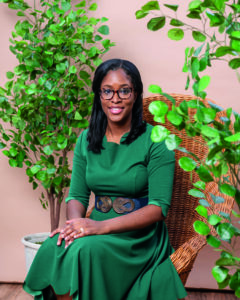Cyemone Douglas ’11
 Degrees: B.A. in educational studies; master’s in curriculum and instruction, Concordia University; Connecticut Teacher Residency Program
Degrees: B.A. in educational studies; master’s in curriculum and instruction, Concordia University; Connecticut Teacher Residency Program
Job Title: Fourth-grade teacher at CREC Museum Academy in Bloomfield, Connecticut
Favorite Trinity Memory: My absolute favorite memories were movie nights with one of my closest friends at Trinity. We could’ve stayed in our dorms to watch movies, but we loved to go to the Raether Center. We reserved spaces that had the big-screen TVs. I cherished those moments and the friendship we developed.
What was your path to your current position? My path to becoming a teacher was not a typical one. I was certain that Trinity would be the foundation I needed to help me one day stand in an operating room performing open heart surgery. Many of my fondest memories include taking science courses. I remember being a lab TA for “Organic Chemistry” and a conversation I had with Professor Tim Curran that gave me the encouragement I needed to continue to believe in myself. His words helped me to embrace my presence at Trinity.
While continuing to pursue the sciences, I decided to take “EDUC 200: Analyzing Schools.” As a Hartford native, I felt a sense of obligation to learn more about the school system. After taking that course, my plans began to shift. The more education courses I took, the more I wanted to pursue education. It wasn’t until later in life that I realized my dream may have changed, but my purpose was revealed.
What do you enjoy most about teaching? Each day I go to work, I have the opportunity to “do life” with my kiddos. Once I became a teacher, I learned pretty quickly that a teacher is more than a person who gives information regarding various content. I enjoy preparing students to become lifelong learners, critical thinkers, and problem solvers. I enjoy taking part in building the foundation to prepare my scholars with the skills needed to become active citizens in society. I enjoy preparing students for fifth grade. I absolutely love greeting my students in the morning. I enjoy the relationship I build with my students; even after they leave my classroom, they embrace me with excitement.
What is the biggest challenge you face? The ability to meet the needs of every single one of my students. [Abraham] Maslow’s hierarchy of needs suggests that there are five levels of needs and that our behavior is motivated by those needs. At the very bottom of this hierarchy are the physiological needs, followed by safety and security, next love and belonging, then self-esteem, and lastly self-actualization. On any given day, I may have students who need some or all of the aforementioned needs met.
What is the goal of your motivational talks for young girls? Between 2015–19, I was privileged to become part of My Daughters Can We Talk, a nonprofit with a mission to empower girls to develop life skills to become leaders and productive citizens. I served as the group leader for the Connecticut chapter. I treasured building relationships with girls who looked like me because I understand the importance of representation. Although my tenure there ended once I finished my master’s, the work continued with my students. In addition, I serve in my local church to continue to empower youth with the life skills necessary to be anything but ordinary. My goal is for my students and the youth I work with to understand that there is a purpose for each of their lives, and they never have to settle for less than the best.
Also, every year my school celebrates College Day as one of the Spirit Days. I asked if I could invite successful people who grew up in Hartford or attended schools in Hartford. I want students to see people who look like them, people who lived in their neighborhoods and were able to become a positive member of society. This year, I invited Channon Miller [’11, Trinity assistant professor of American studies and history].
How did Trinity help prepare you for what you do now? Over the years, I have attributed my ability to think critically and analytically to Trinity. As an ed studies major, we analyzed what worked well and what needed improvement. Most times the discussion ended with how we can learn from the past to make better decisions for the future. When presented with problems, I realize that it is not enough to complain but that I need to think of solutions.
